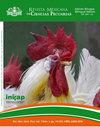Caracterización del suero bovino fetal proveniente de la industria cárnica mexicana en el cultivo celular
IF 0.6
4区 农林科学
Q3 AGRICULTURE, DAIRY & ANIMAL SCIENCE
引用次数: 0
Abstract
The present work aims to characterize a fetal bovine serum (FBS) obtained from the meat industry for use in cell culture. FBS is the most widely used supplement for cell culture since its complex composition provides the necessary nutrients for the growth of most cells. It is a by-product of the meat industry, and its availability and production depend mainly on two uncontrollable external factors, climatic conditions and changes in beef consumption. According to the strict quality features of the International Serum Industry Association (ISIA), tests for total proteins, osmolarity, presence or absence of pathogenic biological agents, pH, DNA concentration, biological contaminants, negative results, and cell viability were performed. The characterization of the serum in the DNA and total protein concentration tests showed significant differences. Additionally, osmolarity and pH did not present significant differences between groups. Regarding the viability test, no complication for cell growth was observed despite the differences found in the characterization. The results showed that the serum obtained from the meat industry could maintain cell cultures and allow cell proliferation compared to commercial serum. Furthermore, if FBS is not available, some kinds of plasma can be used as a surrogate to maintain cell cultures.墨西哥肉类工业胎儿牛血清细胞培养的特性
目前的工作旨在表征胎牛血清(FBS)从肉类工业获得用于细胞培养。FBS是最广泛使用的细胞培养补充剂,因为其复杂的成分为大多数细胞的生长提供了必要的营养。它是肉类工业的副产品,它的供应和生产主要取决于两个不可控的外部因素,气候条件和牛肉消费的变化。根据国际血清工业协会(ISIA)严格的质量标准,进行了总蛋白、渗透压、致病生物制剂的存在与否、pH值、DNA浓度、生物污染物、阴性结果和细胞活力的测试。血清特征在DNA和总蛋白浓度测试中显示出显著差异。此外,渗透压和pH值在组间无显著差异。关于活力测试,尽管在表征上发现了差异,但没有观察到细胞生长的并发症。结果表明,与商业血清相比,从肉类工业中获得的血清可以维持细胞培养并使细胞增殖。此外,如果没有FBS,某些种类的血浆可以用作维持细胞培养的替代品。
本文章由计算机程序翻译,如有差异,请以英文原文为准。
求助全文
约1分钟内获得全文
求助全文
来源期刊

Revista Mexicana de Ciencias Pecuarias
AGRICULTURE, DAIRY & ANIMAL SCIENCE-
CiteScore
1.20
自引率
0.00%
发文量
93
审稿时长
>12 weeks
期刊介绍:
The MEXICAN MAGAZINE OF SCIENCES PECUARIAS is an organ of scientific and technical diffusion of the livestock sector. Its periodicity is quarterly and arbitrated by pairs in the double-blind mode. Its objective is to make known the results of the research carried out by any scientific institution, in Mexico and in any part of the world, related to the livestock sciences, particularly those that refer to the different disciplines of Veterinary Medicine and Animal Science. The Journal is bilingual, publishes the complete articles in Spanish or English and is included in various indexing services and international dissemination platforms, such as the Index of Mexican Journals of Scientific and Technological Research of the National Council of Science and Technology (CONACYT); In the EBSCO Host database; In the Network of Scientific Journals of Latin America and the Caribbean, Spain and Portugal (RedALyC); In the Ibero-American Network of Scientific Journals of Free Access Veterinary Medicine. Indexed in the ISI Journal Citation Report Science Edition; And Elsevier''s SCOPUS and EMBASE indices.
 求助内容:
求助内容: 应助结果提醒方式:
应助结果提醒方式:


